Mental Health Nursing Principles
VerifiedAdded on 2022/12/30
|10
|3140
|55
AI Summary
This assignment sheds light on the causal factors of mental health disorder as well as management plans regarding health issues.
Contribute Materials
Your contribution can guide someone’s learning journey. Share your
documents today.
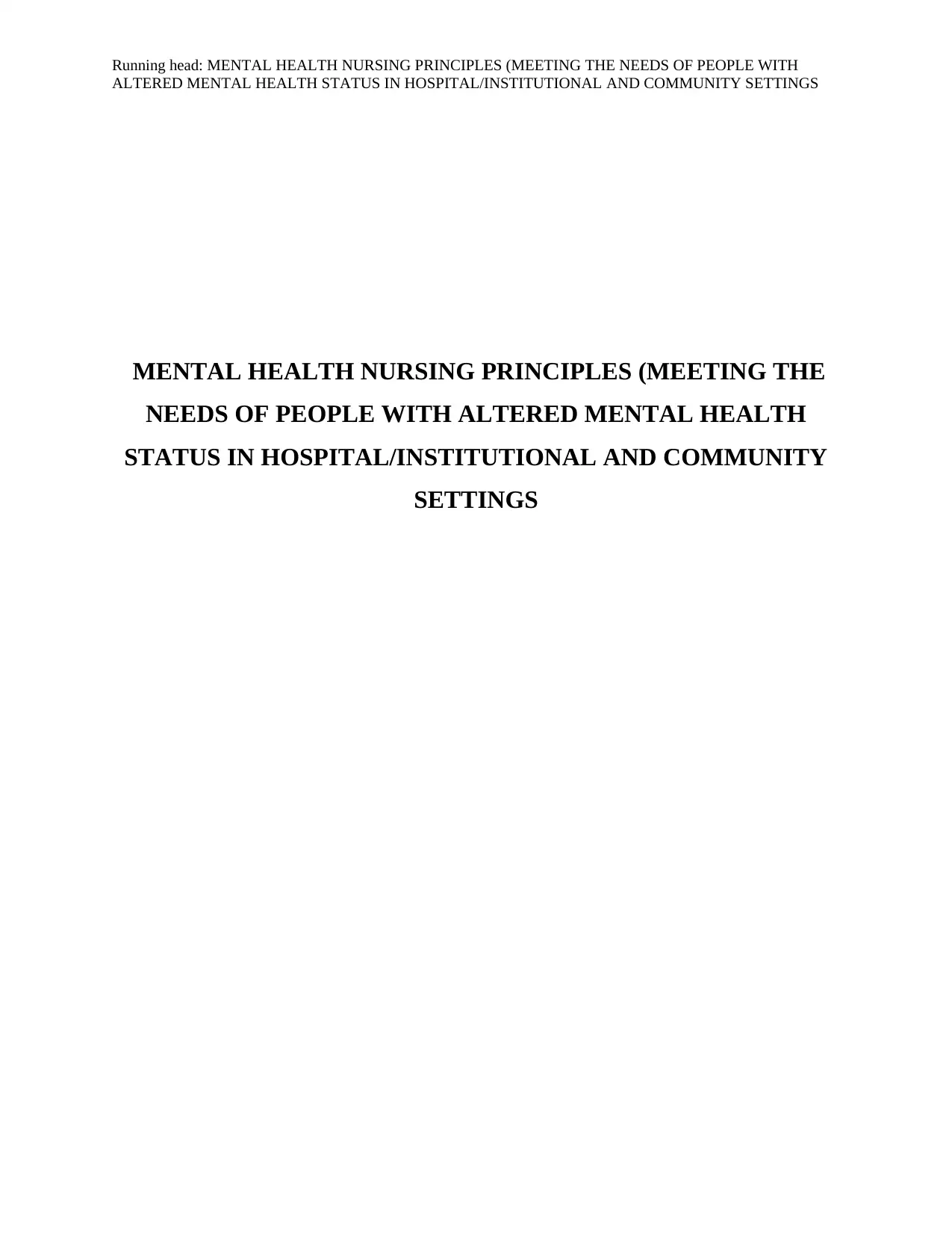
Running head: MENTAL HEALTH NURSING PRINCIPLES (MEETING THE NEEDS OF PEOPLE WITH
ALTERED MENTAL HEALTH STATUS IN HOSPITAL/INSTITUTIONAL AND COMMUNITY SETTINGS
MENTAL HEALTH NURSING PRINCIPLES (MEETING THE
NEEDS OF PEOPLE WITH ALTERED MENTAL HEALTH
STATUS IN HOSPITAL/INSTITUTIONAL AND COMMUNITY
SETTINGS
ALTERED MENTAL HEALTH STATUS IN HOSPITAL/INSTITUTIONAL AND COMMUNITY SETTINGS
MENTAL HEALTH NURSING PRINCIPLES (MEETING THE
NEEDS OF PEOPLE WITH ALTERED MENTAL HEALTH
STATUS IN HOSPITAL/INSTITUTIONAL AND COMMUNITY
SETTINGS
Secure Best Marks with AI Grader
Need help grading? Try our AI Grader for instant feedback on your assignments.
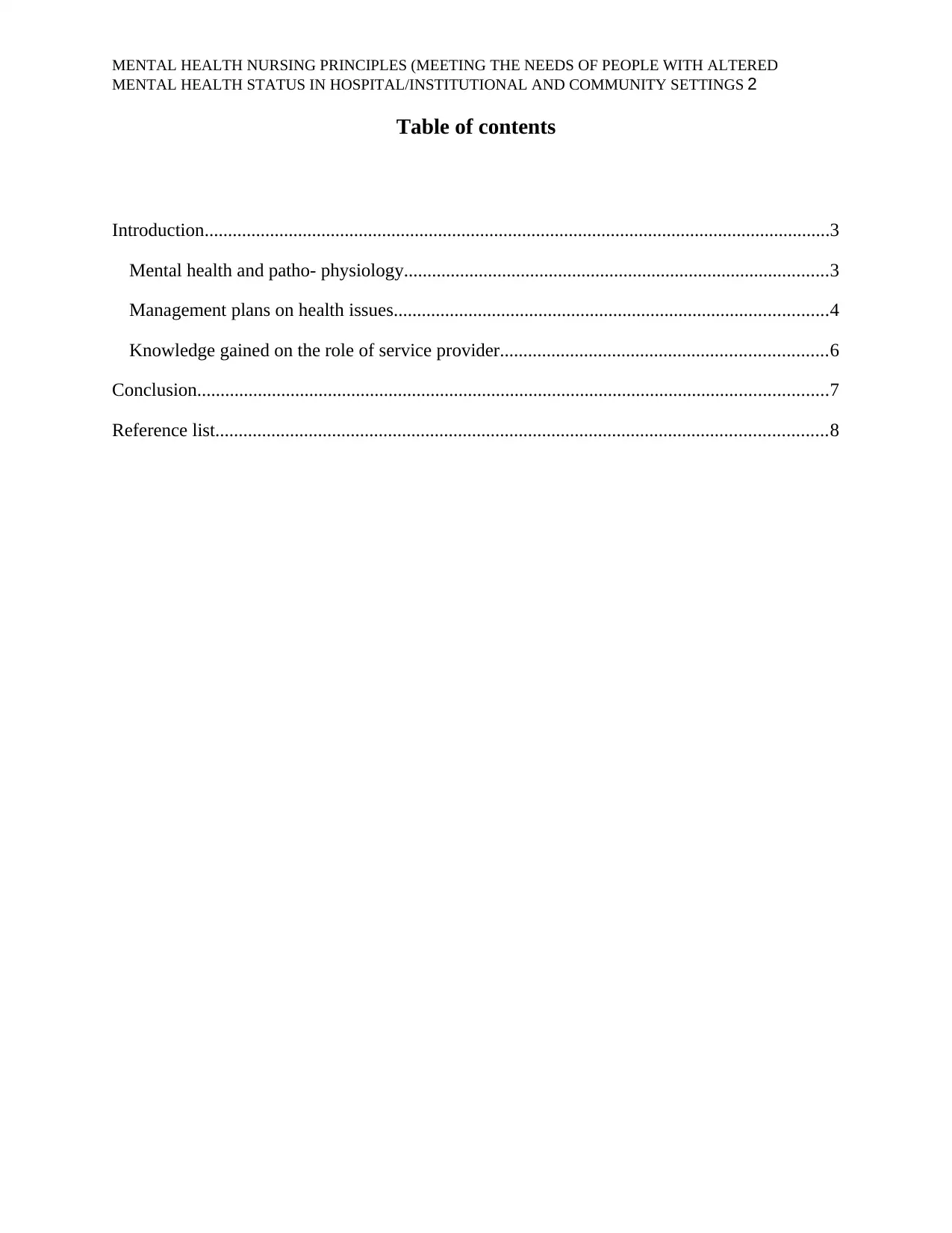
MENTAL HEALTH NURSING PRINCIPLES (MEETING THE NEEDS OF PEOPLE WITH ALTERED
MENTAL HEALTH STATUS IN HOSPITAL/INSTITUTIONAL AND COMMUNITY SETTINGS 2
Table of contents
Introduction......................................................................................................................................3
Mental health and patho- physiology...........................................................................................3
Management plans on health issues.............................................................................................4
Knowledge gained on the role of service provider......................................................................6
Conclusion.......................................................................................................................................7
Reference list...................................................................................................................................8
MENTAL HEALTH STATUS IN HOSPITAL/INSTITUTIONAL AND COMMUNITY SETTINGS 2
Table of contents
Introduction......................................................................................................................................3
Mental health and patho- physiology...........................................................................................3
Management plans on health issues.............................................................................................4
Knowledge gained on the role of service provider......................................................................6
Conclusion.......................................................................................................................................7
Reference list...................................................................................................................................8
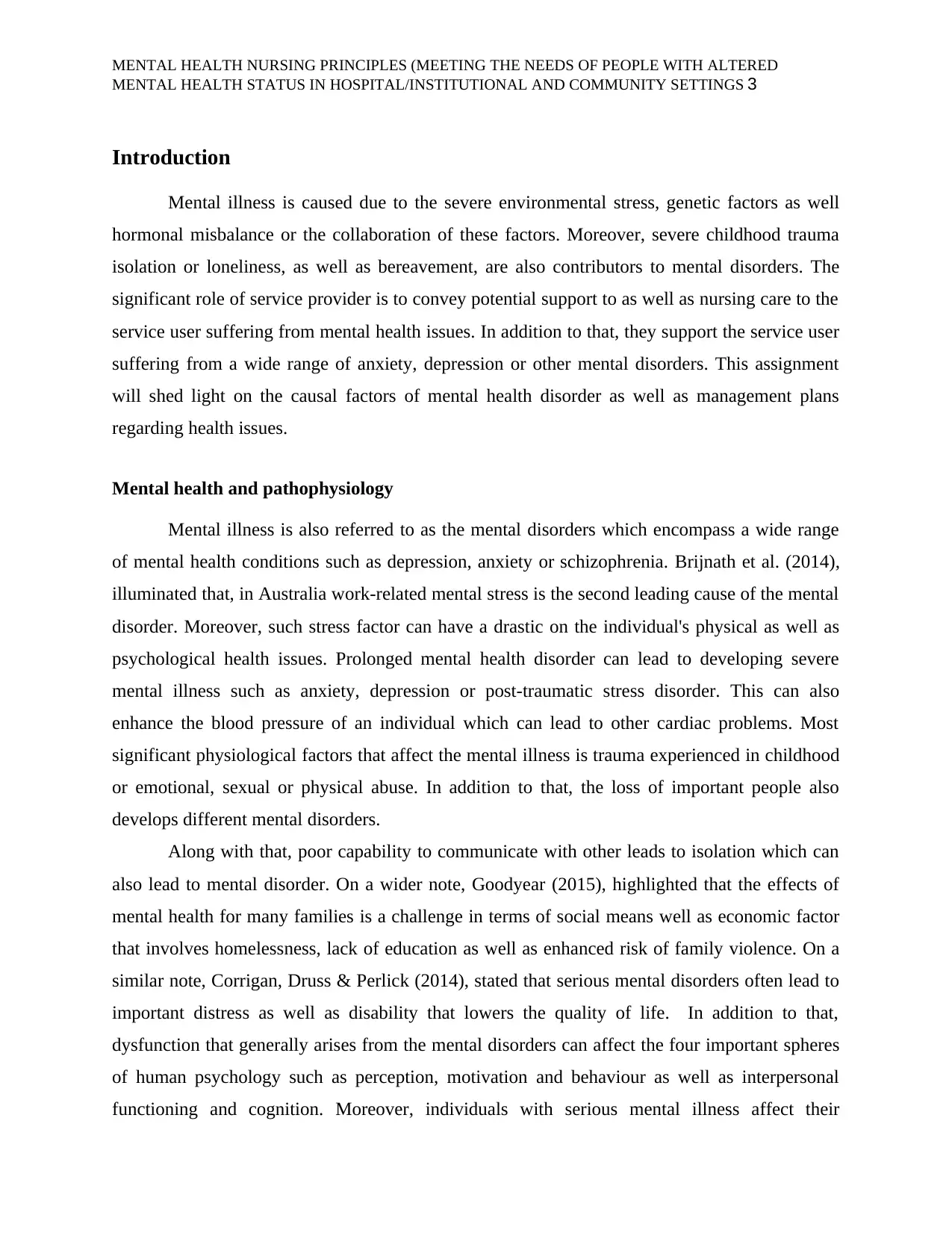
MENTAL HEALTH NURSING PRINCIPLES (MEETING THE NEEDS OF PEOPLE WITH ALTERED
MENTAL HEALTH STATUS IN HOSPITAL/INSTITUTIONAL AND COMMUNITY SETTINGS 3
Introduction
Mental illness is caused due to the severe environmental stress, genetic factors as well
hormonal misbalance or the collaboration of these factors. Moreover, severe childhood trauma
isolation or loneliness, as well as bereavement, are also contributors to mental disorders. The
significant role of service provider is to convey potential support to as well as nursing care to the
service user suffering from mental health issues. In addition to that, they support the service user
suffering from a wide range of anxiety, depression or other mental disorders. This assignment
will shed light on the causal factors of mental health disorder as well as management plans
regarding health issues.
Mental health and pathophysiology
Mental illness is also referred to as the mental disorders which encompass a wide range
of mental health conditions such as depression, anxiety or schizophrenia. Brijnath et al. (2014),
illuminated that, in Australia work-related mental stress is the second leading cause of the mental
disorder. Moreover, such stress factor can have a drastic on the individual's physical as well as
psychological health issues. Prolonged mental health disorder can lead to developing severe
mental illness such as anxiety, depression or post-traumatic stress disorder. This can also
enhance the blood pressure of an individual which can lead to other cardiac problems. Most
significant physiological factors that affect the mental illness is trauma experienced in childhood
or emotional, sexual or physical abuse. In addition to that, the loss of important people also
develops different mental disorders.
Along with that, poor capability to communicate with other leads to isolation which can
also lead to mental disorder. On a wider note, Goodyear (2015), highlighted that the effects of
mental health for many families is a challenge in terms of social means well as economic factor
that involves homelessness, lack of education as well as enhanced risk of family violence. On a
similar note, Corrigan, Druss & Perlick (2014), stated that serious mental disorders often lead to
important distress as well as disability that lowers the quality of life. In addition to that,
dysfunction that generally arises from the mental disorders can affect the four important spheres
of human psychology such as perception, motivation and behaviour as well as interpersonal
functioning and cognition. Moreover, individuals with serious mental illness affect their
MENTAL HEALTH STATUS IN HOSPITAL/INSTITUTIONAL AND COMMUNITY SETTINGS 3
Introduction
Mental illness is caused due to the severe environmental stress, genetic factors as well
hormonal misbalance or the collaboration of these factors. Moreover, severe childhood trauma
isolation or loneliness, as well as bereavement, are also contributors to mental disorders. The
significant role of service provider is to convey potential support to as well as nursing care to the
service user suffering from mental health issues. In addition to that, they support the service user
suffering from a wide range of anxiety, depression or other mental disorders. This assignment
will shed light on the causal factors of mental health disorder as well as management plans
regarding health issues.
Mental health and pathophysiology
Mental illness is also referred to as the mental disorders which encompass a wide range
of mental health conditions such as depression, anxiety or schizophrenia. Brijnath et al. (2014),
illuminated that, in Australia work-related mental stress is the second leading cause of the mental
disorder. Moreover, such stress factor can have a drastic on the individual's physical as well as
psychological health issues. Prolonged mental health disorder can lead to developing severe
mental illness such as anxiety, depression or post-traumatic stress disorder. This can also
enhance the blood pressure of an individual which can lead to other cardiac problems. Most
significant physiological factors that affect the mental illness is trauma experienced in childhood
or emotional, sexual or physical abuse. In addition to that, the loss of important people also
develops different mental disorders.
Along with that, poor capability to communicate with other leads to isolation which can
also lead to mental disorder. On a wider note, Goodyear (2015), highlighted that the effects of
mental health for many families is a challenge in terms of social means well as economic factor
that involves homelessness, lack of education as well as enhanced risk of family violence. On a
similar note, Corrigan, Druss & Perlick (2014), stated that serious mental disorders often lead to
important distress as well as disability that lowers the quality of life. In addition to that,
dysfunction that generally arises from the mental disorders can affect the four important spheres
of human psychology such as perception, motivation and behaviour as well as interpersonal
functioning and cognition. Moreover, individuals with serious mental illness affect their
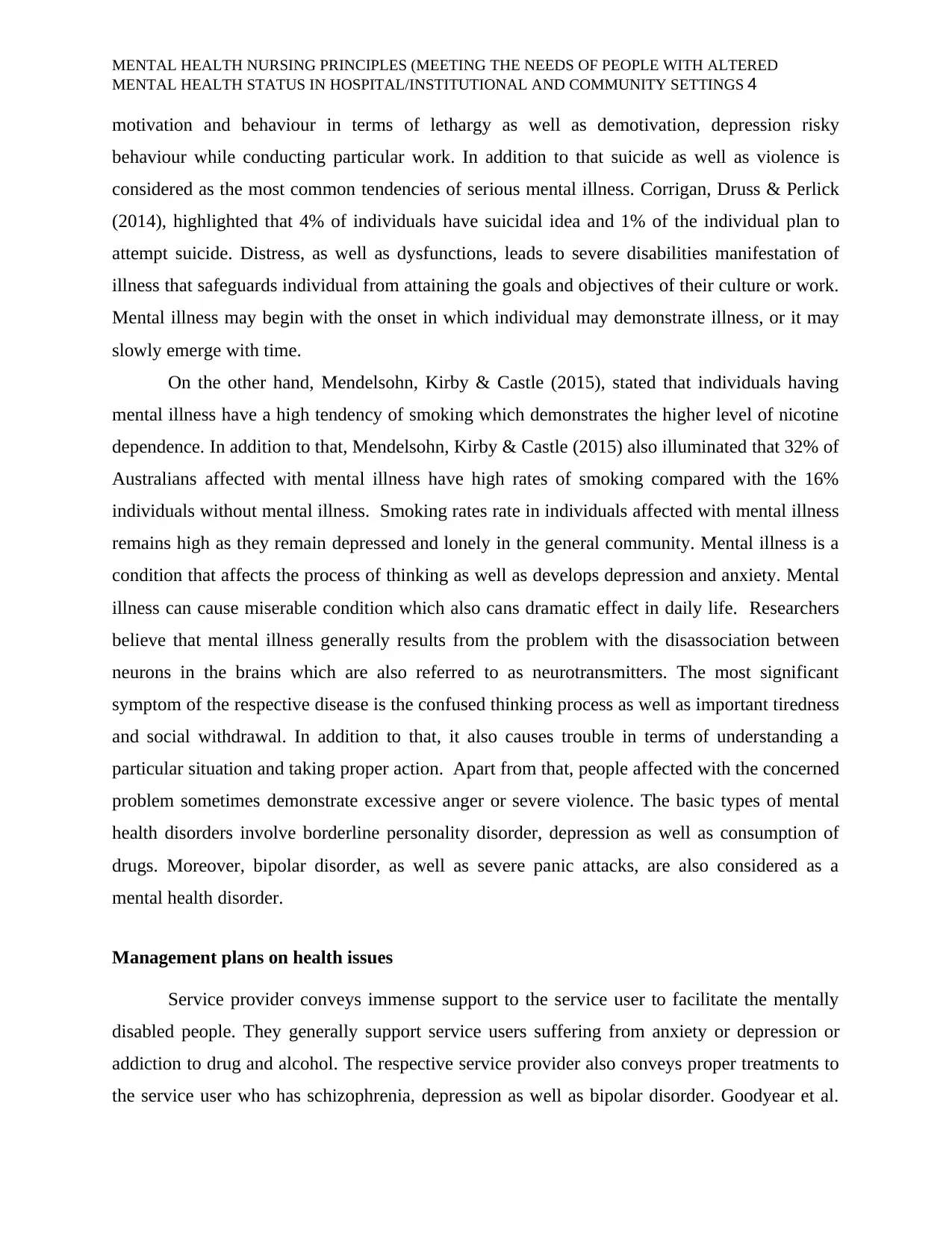
MENTAL HEALTH NURSING PRINCIPLES (MEETING THE NEEDS OF PEOPLE WITH ALTERED
MENTAL HEALTH STATUS IN HOSPITAL/INSTITUTIONAL AND COMMUNITY SETTINGS 4
motivation and behaviour in terms of lethargy as well as demotivation, depression risky
behaviour while conducting particular work. In addition to that suicide as well as violence is
considered as the most common tendencies of serious mental illness. Corrigan, Druss & Perlick
(2014), highlighted that 4% of individuals have suicidal idea and 1% of the individual plan to
attempt suicide. Distress, as well as dysfunctions, leads to severe disabilities manifestation of
illness that safeguards individual from attaining the goals and objectives of their culture or work.
Mental illness may begin with the onset in which individual may demonstrate illness, or it may
slowly emerge with time.
On the other hand, Mendelsohn, Kirby & Castle (2015), stated that individuals having
mental illness have a high tendency of smoking which demonstrates the higher level of nicotine
dependence. In addition to that, Mendelsohn, Kirby & Castle (2015) also illuminated that 32% of
Australians affected with mental illness have high rates of smoking compared with the 16%
individuals without mental illness. Smoking rates rate in individuals affected with mental illness
remains high as they remain depressed and lonely in the general community. Mental illness is a
condition that affects the process of thinking as well as develops depression and anxiety. Mental
illness can cause miserable condition which also cans dramatic effect in daily life. Researchers
believe that mental illness generally results from the problem with the disassociation between
neurons in the brains which are also referred to as neurotransmitters. The most significant
symptom of the respective disease is the confused thinking process as well as important tiredness
and social withdrawal. In addition to that, it also causes trouble in terms of understanding a
particular situation and taking proper action. Apart from that, people affected with the concerned
problem sometimes demonstrate excessive anger or severe violence. The basic types of mental
health disorders involve borderline personality disorder, depression as well as consumption of
drugs. Moreover, bipolar disorder, as well as severe panic attacks, are also considered as a
mental health disorder.
Management plans on health issues
Service provider conveys immense support to the service user to facilitate the mentally
disabled people. They generally support service users suffering from anxiety or depression or
addiction to drug and alcohol. The respective service provider also conveys proper treatments to
the service user who has schizophrenia, depression as well as bipolar disorder. Goodyear et al.
MENTAL HEALTH STATUS IN HOSPITAL/INSTITUTIONAL AND COMMUNITY SETTINGS 4
motivation and behaviour in terms of lethargy as well as demotivation, depression risky
behaviour while conducting particular work. In addition to that suicide as well as violence is
considered as the most common tendencies of serious mental illness. Corrigan, Druss & Perlick
(2014), highlighted that 4% of individuals have suicidal idea and 1% of the individual plan to
attempt suicide. Distress, as well as dysfunctions, leads to severe disabilities manifestation of
illness that safeguards individual from attaining the goals and objectives of their culture or work.
Mental illness may begin with the onset in which individual may demonstrate illness, or it may
slowly emerge with time.
On the other hand, Mendelsohn, Kirby & Castle (2015), stated that individuals having
mental illness have a high tendency of smoking which demonstrates the higher level of nicotine
dependence. In addition to that, Mendelsohn, Kirby & Castle (2015) also illuminated that 32% of
Australians affected with mental illness have high rates of smoking compared with the 16%
individuals without mental illness. Smoking rates rate in individuals affected with mental illness
remains high as they remain depressed and lonely in the general community. Mental illness is a
condition that affects the process of thinking as well as develops depression and anxiety. Mental
illness can cause miserable condition which also cans dramatic effect in daily life. Researchers
believe that mental illness generally results from the problem with the disassociation between
neurons in the brains which are also referred to as neurotransmitters. The most significant
symptom of the respective disease is the confused thinking process as well as important tiredness
and social withdrawal. In addition to that, it also causes trouble in terms of understanding a
particular situation and taking proper action. Apart from that, people affected with the concerned
problem sometimes demonstrate excessive anger or severe violence. The basic types of mental
health disorders involve borderline personality disorder, depression as well as consumption of
drugs. Moreover, bipolar disorder, as well as severe panic attacks, are also considered as a
mental health disorder.
Management plans on health issues
Service provider conveys immense support to the service user to facilitate the mentally
disabled people. They generally support service users suffering from anxiety or depression or
addiction to drug and alcohol. The respective service provider also conveys proper treatments to
the service user who has schizophrenia, depression as well as bipolar disorder. Goodyear et al.
Secure Best Marks with AI Grader
Need help grading? Try our AI Grader for instant feedback on your assignments.
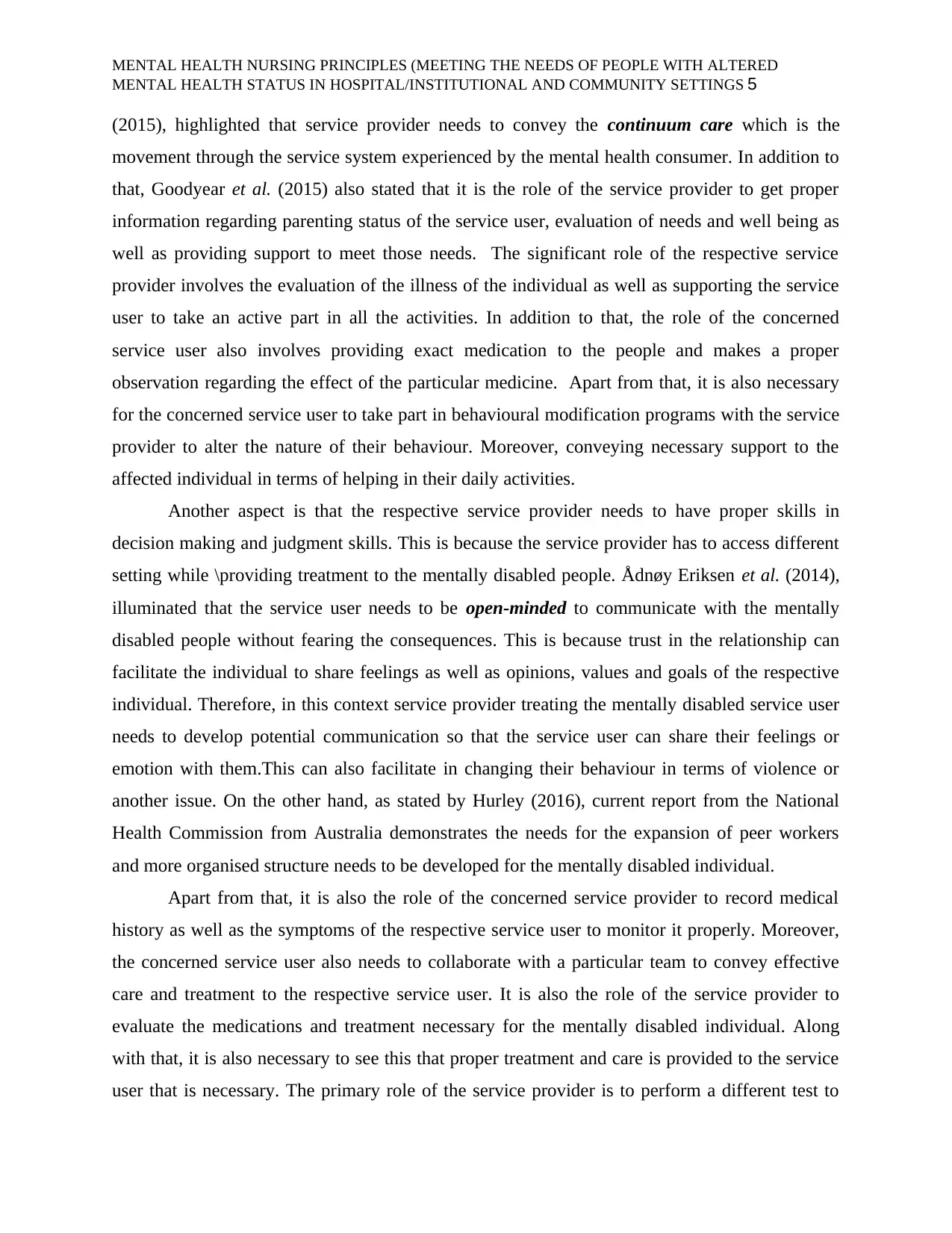
MENTAL HEALTH NURSING PRINCIPLES (MEETING THE NEEDS OF PEOPLE WITH ALTERED
MENTAL HEALTH STATUS IN HOSPITAL/INSTITUTIONAL AND COMMUNITY SETTINGS 5
(2015), highlighted that service provider needs to convey the continuum care which is the
movement through the service system experienced by the mental health consumer. In addition to
that, Goodyear et al. (2015) also stated that it is the role of the service provider to get proper
information regarding parenting status of the service user, evaluation of needs and well being as
well as providing support to meet those needs. The significant role of the respective service
provider involves the evaluation of the illness of the individual as well as supporting the service
user to take an active part in all the activities. In addition to that, the role of the concerned
service user also involves providing exact medication to the people and makes a proper
observation regarding the effect of the particular medicine. Apart from that, it is also necessary
for the concerned service user to take part in behavioural modification programs with the service
provider to alter the nature of their behaviour. Moreover, conveying necessary support to the
affected individual in terms of helping in their daily activities.
Another aspect is that the respective service provider needs to have proper skills in
decision making and judgment skills. This is because the service provider has to access different
setting while \providing treatment to the mentally disabled people. Ådnøy Eriksen et al. (2014),
illuminated that the service user needs to be open-minded to communicate with the mentally
disabled people without fearing the consequences. This is because trust in the relationship can
facilitate the individual to share feelings as well as opinions, values and goals of the respective
individual. Therefore, in this context service provider treating the mentally disabled service user
needs to develop potential communication so that the service user can share their feelings or
emotion with them.This can also facilitate in changing their behaviour in terms of violence or
another issue. On the other hand, as stated by Hurley (2016), current report from the National
Health Commission from Australia demonstrates the needs for the expansion of peer workers
and more organised structure needs to be developed for the mentally disabled individual.
Apart from that, it is also the role of the concerned service provider to record medical
history as well as the symptoms of the respective service user to monitor it properly. Moreover,
the concerned service user also needs to collaborate with a particular team to convey effective
care and treatment to the respective service user. It is also the role of the service provider to
evaluate the medications and treatment necessary for the mentally disabled individual. Along
with that, it is also necessary to see this that proper treatment and care is provided to the service
user that is necessary. The primary role of the service provider is to perform a different test to
MENTAL HEALTH STATUS IN HOSPITAL/INSTITUTIONAL AND COMMUNITY SETTINGS 5
(2015), highlighted that service provider needs to convey the continuum care which is the
movement through the service system experienced by the mental health consumer. In addition to
that, Goodyear et al. (2015) also stated that it is the role of the service provider to get proper
information regarding parenting status of the service user, evaluation of needs and well being as
well as providing support to meet those needs. The significant role of the respective service
provider involves the evaluation of the illness of the individual as well as supporting the service
user to take an active part in all the activities. In addition to that, the role of the concerned
service user also involves providing exact medication to the people and makes a proper
observation regarding the effect of the particular medicine. Apart from that, it is also necessary
for the concerned service user to take part in behavioural modification programs with the service
provider to alter the nature of their behaviour. Moreover, conveying necessary support to the
affected individual in terms of helping in their daily activities.
Another aspect is that the respective service provider needs to have proper skills in
decision making and judgment skills. This is because the service provider has to access different
setting while \providing treatment to the mentally disabled people. Ådnøy Eriksen et al. (2014),
illuminated that the service user needs to be open-minded to communicate with the mentally
disabled people without fearing the consequences. This is because trust in the relationship can
facilitate the individual to share feelings as well as opinions, values and goals of the respective
individual. Therefore, in this context service provider treating the mentally disabled service user
needs to develop potential communication so that the service user can share their feelings or
emotion with them.This can also facilitate in changing their behaviour in terms of violence or
another issue. On the other hand, as stated by Hurley (2016), current report from the National
Health Commission from Australia demonstrates the needs for the expansion of peer workers
and more organised structure needs to be developed for the mentally disabled individual.
Apart from that, it is also the role of the concerned service provider to record medical
history as well as the symptoms of the respective service user to monitor it properly. Moreover,
the concerned service user also needs to collaborate with a particular team to convey effective
care and treatment to the respective service user. It is also the role of the service provider to
evaluate the medications and treatment necessary for the mentally disabled individual. Along
with that, it is also necessary to see this that proper treatment and care is provided to the service
user that is necessary. The primary role of the service provider is to perform a different test to
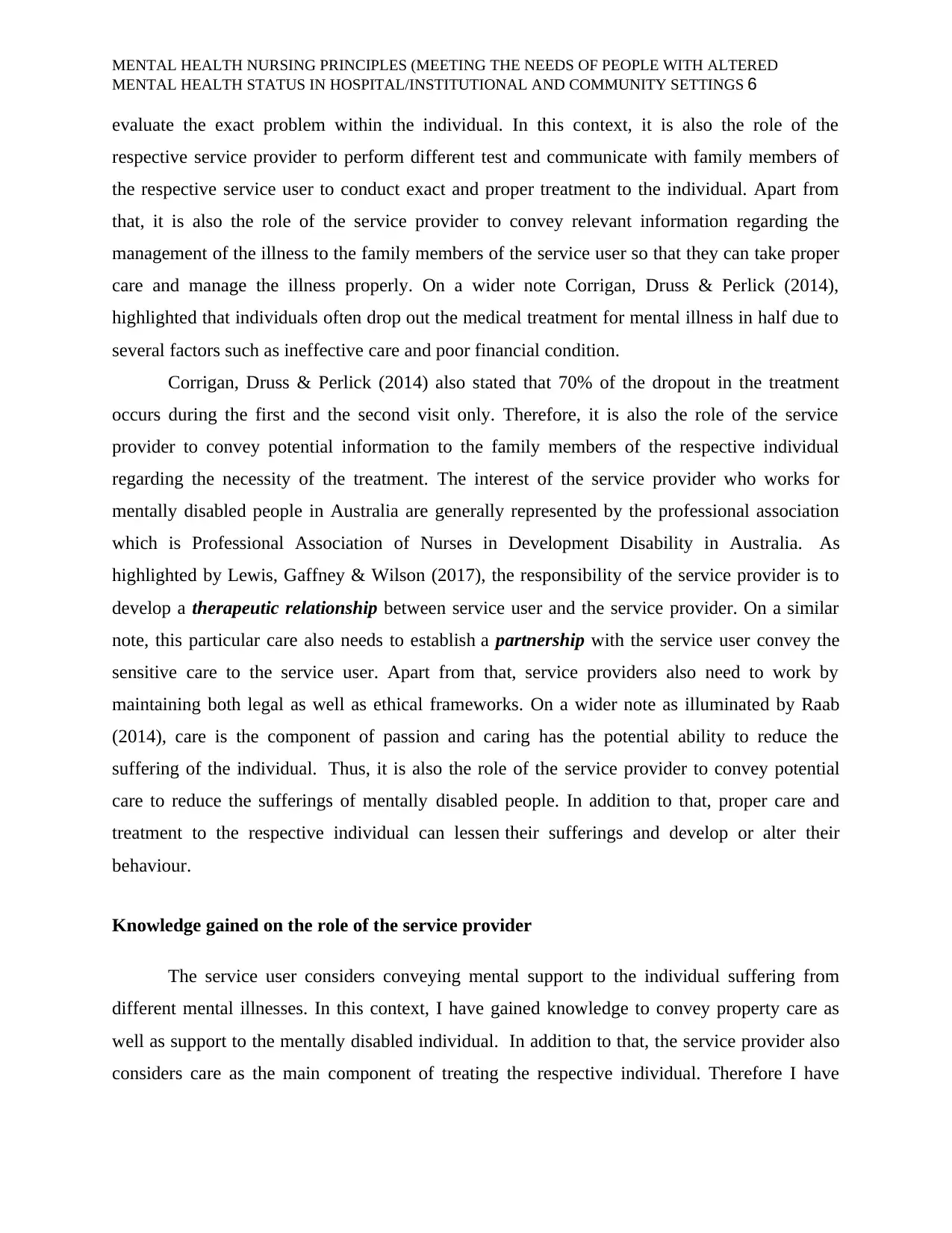
MENTAL HEALTH NURSING PRINCIPLES (MEETING THE NEEDS OF PEOPLE WITH ALTERED
MENTAL HEALTH STATUS IN HOSPITAL/INSTITUTIONAL AND COMMUNITY SETTINGS 6
evaluate the exact problem within the individual. In this context, it is also the role of the
respective service provider to perform different test and communicate with family members of
the respective service user to conduct exact and proper treatment to the individual. Apart from
that, it is also the role of the service provider to convey relevant information regarding the
management of the illness to the family members of the service user so that they can take proper
care and manage the illness properly. On a wider note Corrigan, Druss & Perlick (2014),
highlighted that individuals often drop out the medical treatment for mental illness in half due to
several factors such as ineffective care and poor financial condition.
Corrigan, Druss & Perlick (2014) also stated that 70% of the dropout in the treatment
occurs during the first and the second visit only. Therefore, it is also the role of the service
provider to convey potential information to the family members of the respective individual
regarding the necessity of the treatment. The interest of the service provider who works for
mentally disabled people in Australia are generally represented by the professional association
which is Professional Association of Nurses in Development Disability in Australia. As
highlighted by Lewis, Gaffney & Wilson (2017), the responsibility of the service provider is to
develop a therapeutic relationship between service user and the service provider. On a similar
note, this particular care also needs to establish a partnership with the service user convey the
sensitive care to the service user. Apart from that, service providers also need to work by
maintaining both legal as well as ethical frameworks. On a wider note as illuminated by Raab
(2014), care is the component of passion and caring has the potential ability to reduce the
suffering of the individual. Thus, it is also the role of the service provider to convey potential
care to reduce the sufferings of mentally disabled people. In addition to that, proper care and
treatment to the respective individual can lessen their sufferings and develop or alter their
behaviour.
Knowledge gained on the role of the service provider
The service user considers conveying mental support to the individual suffering from
different mental illnesses. In this context, I have gained knowledge to convey property care as
well as support to the mentally disabled individual. In addition to that, the service provider also
considers care as the main component of treating the respective individual. Therefore I have
MENTAL HEALTH STATUS IN HOSPITAL/INSTITUTIONAL AND COMMUNITY SETTINGS 6
evaluate the exact problem within the individual. In this context, it is also the role of the
respective service provider to perform different test and communicate with family members of
the respective service user to conduct exact and proper treatment to the individual. Apart from
that, it is also the role of the service provider to convey relevant information regarding the
management of the illness to the family members of the service user so that they can take proper
care and manage the illness properly. On a wider note Corrigan, Druss & Perlick (2014),
highlighted that individuals often drop out the medical treatment for mental illness in half due to
several factors such as ineffective care and poor financial condition.
Corrigan, Druss & Perlick (2014) also stated that 70% of the dropout in the treatment
occurs during the first and the second visit only. Therefore, it is also the role of the service
provider to convey potential information to the family members of the respective individual
regarding the necessity of the treatment. The interest of the service provider who works for
mentally disabled people in Australia are generally represented by the professional association
which is Professional Association of Nurses in Development Disability in Australia. As
highlighted by Lewis, Gaffney & Wilson (2017), the responsibility of the service provider is to
develop a therapeutic relationship between service user and the service provider. On a similar
note, this particular care also needs to establish a partnership with the service user convey the
sensitive care to the service user. Apart from that, service providers also need to work by
maintaining both legal as well as ethical frameworks. On a wider note as illuminated by Raab
(2014), care is the component of passion and caring has the potential ability to reduce the
suffering of the individual. Thus, it is also the role of the service provider to convey potential
care to reduce the sufferings of mentally disabled people. In addition to that, proper care and
treatment to the respective individual can lessen their sufferings and develop or alter their
behaviour.
Knowledge gained on the role of the service provider
The service user considers conveying mental support to the individual suffering from
different mental illnesses. In this context, I have gained knowledge to convey property care as
well as support to the mentally disabled individual. In addition to that, the service provider also
considers care as the main component of treating the respective individual. Therefore I have
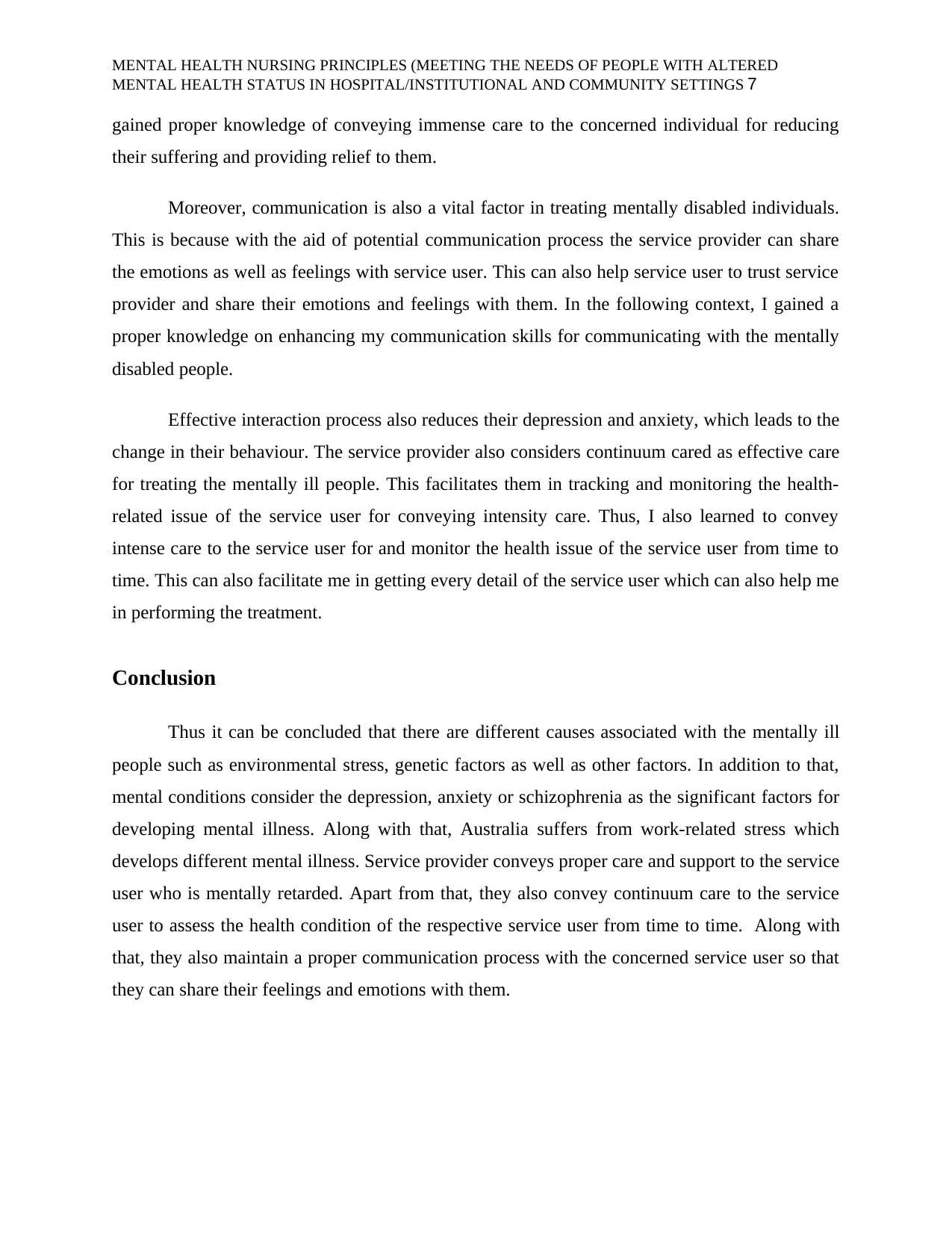
MENTAL HEALTH NURSING PRINCIPLES (MEETING THE NEEDS OF PEOPLE WITH ALTERED
MENTAL HEALTH STATUS IN HOSPITAL/INSTITUTIONAL AND COMMUNITY SETTINGS 7
gained proper knowledge of conveying immense care to the concerned individual for reducing
their suffering and providing relief to them.
Moreover, communication is also a vital factor in treating mentally disabled individuals.
This is because with the aid of potential communication process the service provider can share
the emotions as well as feelings with service user. This can also help service user to trust service
provider and share their emotions and feelings with them. In the following context, I gained a
proper knowledge on enhancing my communication skills for communicating with the mentally
disabled people.
Effective interaction process also reduces their depression and anxiety, which leads to the
change in their behaviour. The service provider also considers continuum cared as effective care
for treating the mentally ill people. This facilitates them in tracking and monitoring the health-
related issue of the service user for conveying intensity care. Thus, I also learned to convey
intense care to the service user for and monitor the health issue of the service user from time to
time. This can also facilitate me in getting every detail of the service user which can also help me
in performing the treatment.
Conclusion
Thus it can be concluded that there are different causes associated with the mentally ill
people such as environmental stress, genetic factors as well as other factors. In addition to that,
mental conditions consider the depression, anxiety or schizophrenia as the significant factors for
developing mental illness. Along with that, Australia suffers from work-related stress which
develops different mental illness. Service provider conveys proper care and support to the service
user who is mentally retarded. Apart from that, they also convey continuum care to the service
user to assess the health condition of the respective service user from time to time. Along with
that, they also maintain a proper communication process with the concerned service user so that
they can share their feelings and emotions with them.
MENTAL HEALTH STATUS IN HOSPITAL/INSTITUTIONAL AND COMMUNITY SETTINGS 7
gained proper knowledge of conveying immense care to the concerned individual for reducing
their suffering and providing relief to them.
Moreover, communication is also a vital factor in treating mentally disabled individuals.
This is because with the aid of potential communication process the service provider can share
the emotions as well as feelings with service user. This can also help service user to trust service
provider and share their emotions and feelings with them. In the following context, I gained a
proper knowledge on enhancing my communication skills for communicating with the mentally
disabled people.
Effective interaction process also reduces their depression and anxiety, which leads to the
change in their behaviour. The service provider also considers continuum cared as effective care
for treating the mentally ill people. This facilitates them in tracking and monitoring the health-
related issue of the service user for conveying intensity care. Thus, I also learned to convey
intense care to the service user for and monitor the health issue of the service user from time to
time. This can also facilitate me in getting every detail of the service user which can also help me
in performing the treatment.
Conclusion
Thus it can be concluded that there are different causes associated with the mentally ill
people such as environmental stress, genetic factors as well as other factors. In addition to that,
mental conditions consider the depression, anxiety or schizophrenia as the significant factors for
developing mental illness. Along with that, Australia suffers from work-related stress which
develops different mental illness. Service provider conveys proper care and support to the service
user who is mentally retarded. Apart from that, they also convey continuum care to the service
user to assess the health condition of the respective service user from time to time. Along with
that, they also maintain a proper communication process with the concerned service user so that
they can share their feelings and emotions with them.
Paraphrase This Document
Need a fresh take? Get an instant paraphrase of this document with our AI Paraphraser
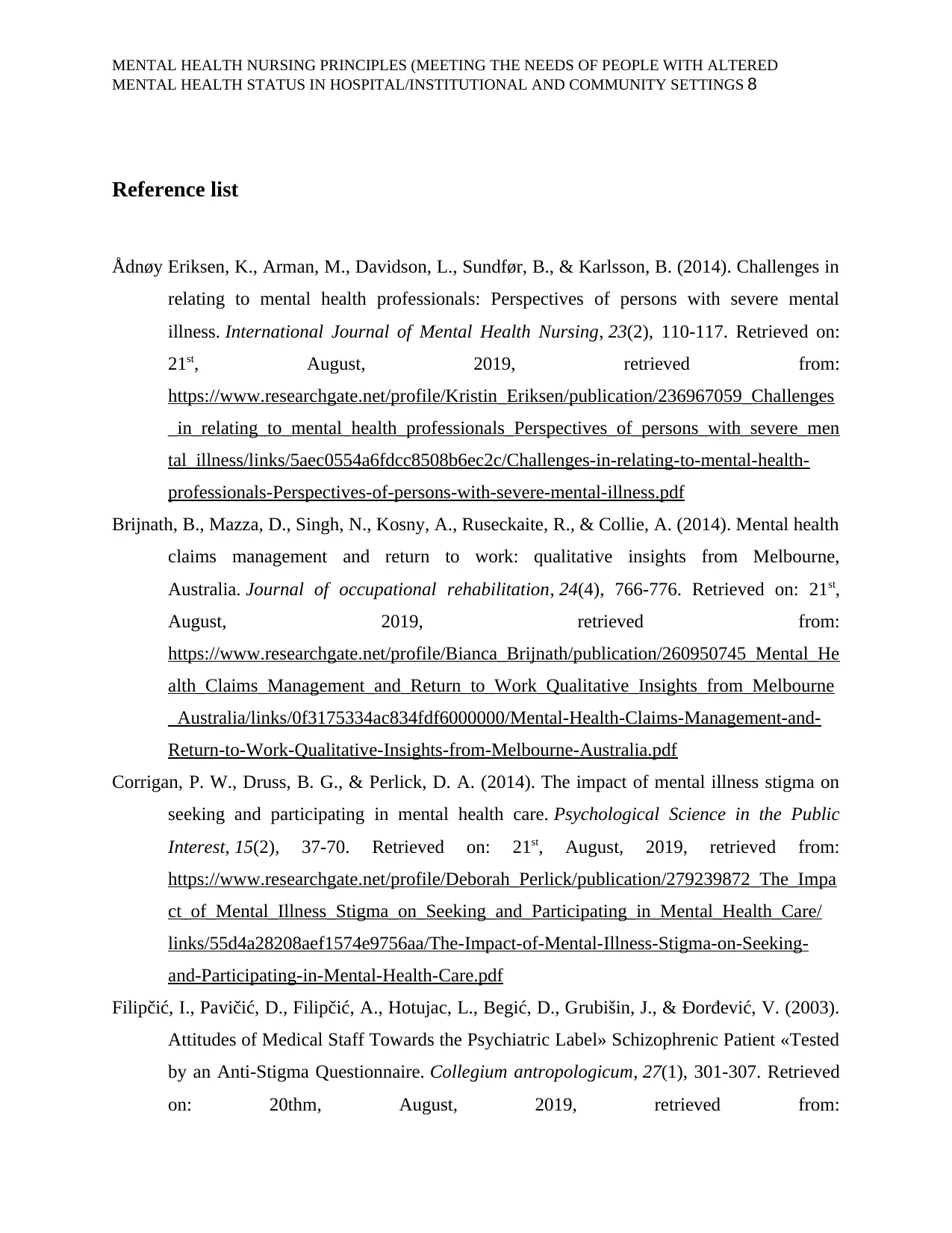
MENTAL HEALTH NURSING PRINCIPLES (MEETING THE NEEDS OF PEOPLE WITH ALTERED
MENTAL HEALTH STATUS IN HOSPITAL/INSTITUTIONAL AND COMMUNITY SETTINGS 8
Reference list
Ådnøy Eriksen, K., Arman, M., Davidson, L., Sundfør, B., & Karlsson, B. (2014). Challenges in
relating to mental health professionals: Perspectives of persons with severe mental
illness. International Journal of Mental Health Nursing, 23(2), 110-117. Retrieved on:
21st, August, 2019, retrieved from:
https://www.researchgate.net/profile/Kristin_Eriksen/publication/236967059_Challenges
_in_relating_to_mental_health_professionals_Perspectives_of_persons_with_severe_men
tal_illness/links/5aec0554a6fdcc8508b6ec2c/Challenges-in-relating-to-mental-health-
professionals-Perspectives-of-persons-with-severe-mental-illness.pdf
Brijnath, B., Mazza, D., Singh, N., Kosny, A., Ruseckaite, R., & Collie, A. (2014). Mental health
claims management and return to work: qualitative insights from Melbourne,
Australia. Journal of occupational rehabilitation, 24(4), 766-776. Retrieved on: 21st,
August, 2019, retrieved from:
https://www.researchgate.net/profile/Bianca_Brijnath/publication/260950745_Mental_He
alth_Claims_Management_and_Return_to_Work_Qualitative_Insights_from_Melbourne
_Australia/links/0f3175334ac834fdf6000000/Mental-Health-Claims-Management-and-
Return-to-Work-Qualitative-Insights-from-Melbourne-Australia.pdf
Corrigan, P. W., Druss, B. G., & Perlick, D. A. (2014). The impact of mental illness stigma on
seeking and participating in mental health care. Psychological Science in the Public
Interest, 15(2), 37-70. Retrieved on: 21st, August, 2019, retrieved from:
https://www.researchgate.net/profile/Deborah_Perlick/publication/279239872_The_Impa
ct_of_Mental_Illness_Stigma_on_Seeking_and_Participating_in_Mental_Health_Care/
links/55d4a28208aef1574e9756aa/The-Impact-of-Mental-Illness-Stigma-on-Seeking-
and-Participating-in-Mental-Health-Care.pdf
Filipčić, I., Pavičić, D., Filipčić, A., Hotujac, L., Begić, D., Grubišin, J., & Đorđević, V. (2003).
Attitudes of Medical Staff Towards the Psychiatric Label» Schizophrenic Patient «Tested
by an Anti-Stigma Questionnaire. Collegium antropologicum, 27(1), 301-307. Retrieved
on: 20thm, August, 2019, retrieved from:
MENTAL HEALTH STATUS IN HOSPITAL/INSTITUTIONAL AND COMMUNITY SETTINGS 8
Reference list
Ådnøy Eriksen, K., Arman, M., Davidson, L., Sundfør, B., & Karlsson, B. (2014). Challenges in
relating to mental health professionals: Perspectives of persons with severe mental
illness. International Journal of Mental Health Nursing, 23(2), 110-117. Retrieved on:
21st, August, 2019, retrieved from:
https://www.researchgate.net/profile/Kristin_Eriksen/publication/236967059_Challenges
_in_relating_to_mental_health_professionals_Perspectives_of_persons_with_severe_men
tal_illness/links/5aec0554a6fdcc8508b6ec2c/Challenges-in-relating-to-mental-health-
professionals-Perspectives-of-persons-with-severe-mental-illness.pdf
Brijnath, B., Mazza, D., Singh, N., Kosny, A., Ruseckaite, R., & Collie, A. (2014). Mental health
claims management and return to work: qualitative insights from Melbourne,
Australia. Journal of occupational rehabilitation, 24(4), 766-776. Retrieved on: 21st,
August, 2019, retrieved from:
https://www.researchgate.net/profile/Bianca_Brijnath/publication/260950745_Mental_He
alth_Claims_Management_and_Return_to_Work_Qualitative_Insights_from_Melbourne
_Australia/links/0f3175334ac834fdf6000000/Mental-Health-Claims-Management-and-
Return-to-Work-Qualitative-Insights-from-Melbourne-Australia.pdf
Corrigan, P. W., Druss, B. G., & Perlick, D. A. (2014). The impact of mental illness stigma on
seeking and participating in mental health care. Psychological Science in the Public
Interest, 15(2), 37-70. Retrieved on: 21st, August, 2019, retrieved from:
https://www.researchgate.net/profile/Deborah_Perlick/publication/279239872_The_Impa
ct_of_Mental_Illness_Stigma_on_Seeking_and_Participating_in_Mental_Health_Care/
links/55d4a28208aef1574e9756aa/The-Impact-of-Mental-Illness-Stigma-on-Seeking-
and-Participating-in-Mental-Health-Care.pdf
Filipčić, I., Pavičić, D., Filipčić, A., Hotujac, L., Begić, D., Grubišin, J., & Đorđević, V. (2003).
Attitudes of Medical Staff Towards the Psychiatric Label» Schizophrenic Patient «Tested
by an Anti-Stigma Questionnaire. Collegium antropologicum, 27(1), 301-307. Retrieved
on: 20thm, August, 2019, retrieved from:
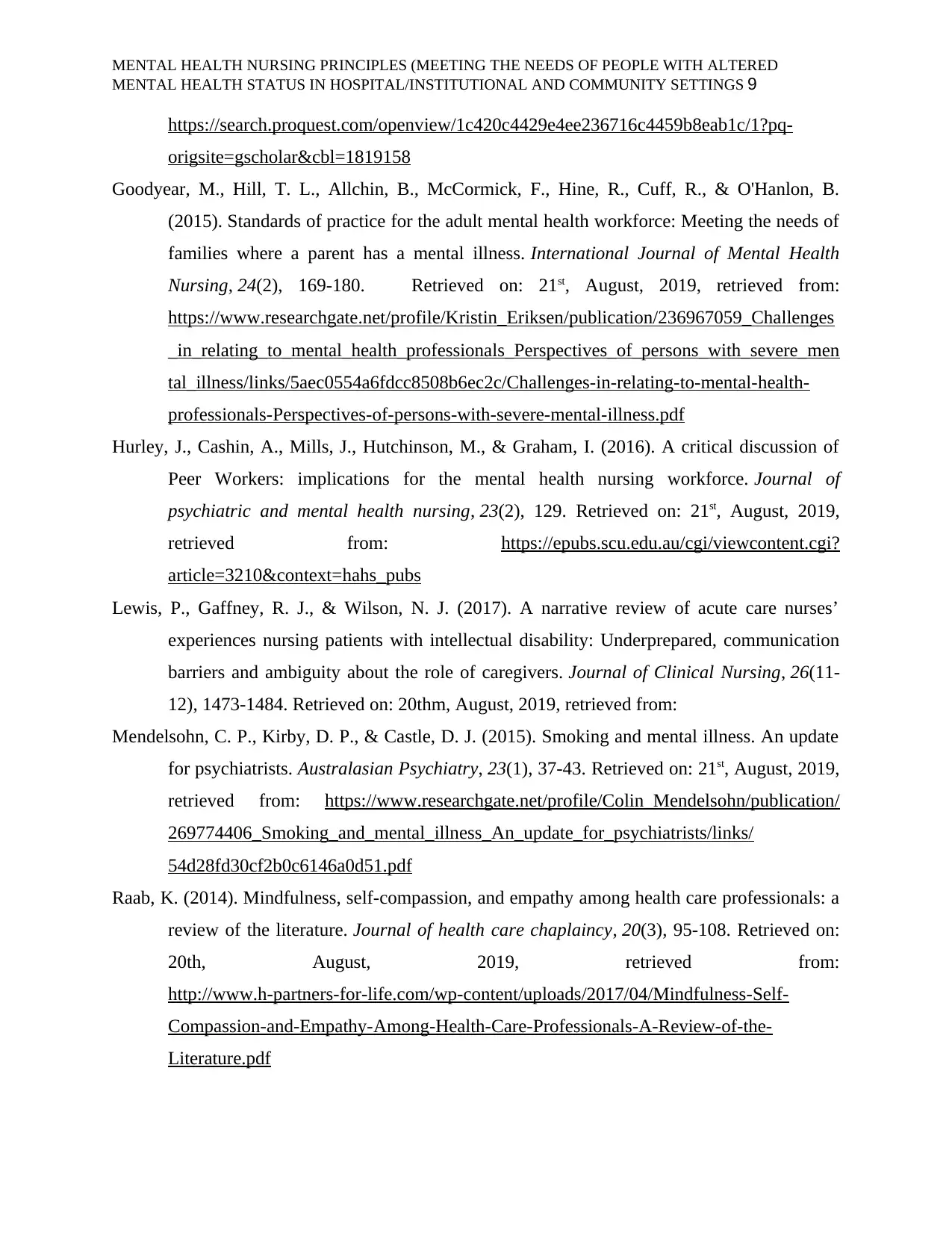
MENTAL HEALTH NURSING PRINCIPLES (MEETING THE NEEDS OF PEOPLE WITH ALTERED
MENTAL HEALTH STATUS IN HOSPITAL/INSTITUTIONAL AND COMMUNITY SETTINGS 9
https://search.proquest.com/openview/1c420c4429e4ee236716c4459b8eab1c/1?pq-
origsite=gscholar&cbl=1819158
Goodyear, M., Hill, T. L., Allchin, B., McCormick, F., Hine, R., Cuff, R., & O'Hanlon, B.
(2015). Standards of practice for the adult mental health workforce: Meeting the needs of
families where a parent has a mental illness. International Journal of Mental Health
Nursing, 24(2), 169-180. Retrieved on: 21st, August, 2019, retrieved from:
https://www.researchgate.net/profile/Kristin_Eriksen/publication/236967059_Challenges
_in_relating_to_mental_health_professionals_Perspectives_of_persons_with_severe_men
tal_illness/links/5aec0554a6fdcc8508b6ec2c/Challenges-in-relating-to-mental-health-
professionals-Perspectives-of-persons-with-severe-mental-illness.pdf
Hurley, J., Cashin, A., Mills, J., Hutchinson, M., & Graham, I. (2016). A critical discussion of
Peer Workers: implications for the mental health nursing workforce. Journal of
psychiatric and mental health nursing, 23(2), 129. Retrieved on: 21st, August, 2019,
retrieved from: https://epubs.scu.edu.au/cgi/viewcontent.cgi?
article=3210&context=hahs_pubs
Lewis, P., Gaffney, R. J., & Wilson, N. J. (2017). A narrative review of acute care nurses’
experiences nursing patients with intellectual disability: Underprepared, communication
barriers and ambiguity about the role of caregivers. Journal of Clinical Nursing, 26(11-
12), 1473-1484. Retrieved on: 20thm, August, 2019, retrieved from:
Mendelsohn, C. P., Kirby, D. P., & Castle, D. J. (2015). Smoking and mental illness. An update
for psychiatrists. Australasian Psychiatry, 23(1), 37-43. Retrieved on: 21st, August, 2019,
retrieved from: https://www.researchgate.net/profile/Colin_Mendelsohn/publication/
269774406_Smoking_and_mental_illness_An_update_for_psychiatrists/links/
54d28fd30cf2b0c6146a0d51.pdf
Raab, K. (2014). Mindfulness, self-compassion, and empathy among health care professionals: a
review of the literature. Journal of health care chaplaincy, 20(3), 95-108. Retrieved on:
20th, August, 2019, retrieved from:
http://www.h-partners-for-life.com/wp-content/uploads/2017/04/Mindfulness-Self-
Compassion-and-Empathy-Among-Health-Care-Professionals-A-Review-of-the-
Literature.pdf
MENTAL HEALTH STATUS IN HOSPITAL/INSTITUTIONAL AND COMMUNITY SETTINGS 9
https://search.proquest.com/openview/1c420c4429e4ee236716c4459b8eab1c/1?pq-
origsite=gscholar&cbl=1819158
Goodyear, M., Hill, T. L., Allchin, B., McCormick, F., Hine, R., Cuff, R., & O'Hanlon, B.
(2015). Standards of practice for the adult mental health workforce: Meeting the needs of
families where a parent has a mental illness. International Journal of Mental Health
Nursing, 24(2), 169-180. Retrieved on: 21st, August, 2019, retrieved from:
https://www.researchgate.net/profile/Kristin_Eriksen/publication/236967059_Challenges
_in_relating_to_mental_health_professionals_Perspectives_of_persons_with_severe_men
tal_illness/links/5aec0554a6fdcc8508b6ec2c/Challenges-in-relating-to-mental-health-
professionals-Perspectives-of-persons-with-severe-mental-illness.pdf
Hurley, J., Cashin, A., Mills, J., Hutchinson, M., & Graham, I. (2016). A critical discussion of
Peer Workers: implications for the mental health nursing workforce. Journal of
psychiatric and mental health nursing, 23(2), 129. Retrieved on: 21st, August, 2019,
retrieved from: https://epubs.scu.edu.au/cgi/viewcontent.cgi?
article=3210&context=hahs_pubs
Lewis, P., Gaffney, R. J., & Wilson, N. J. (2017). A narrative review of acute care nurses’
experiences nursing patients with intellectual disability: Underprepared, communication
barriers and ambiguity about the role of caregivers. Journal of Clinical Nursing, 26(11-
12), 1473-1484. Retrieved on: 20thm, August, 2019, retrieved from:
Mendelsohn, C. P., Kirby, D. P., & Castle, D. J. (2015). Smoking and mental illness. An update
for psychiatrists. Australasian Psychiatry, 23(1), 37-43. Retrieved on: 21st, August, 2019,
retrieved from: https://www.researchgate.net/profile/Colin_Mendelsohn/publication/
269774406_Smoking_and_mental_illness_An_update_for_psychiatrists/links/
54d28fd30cf2b0c6146a0d51.pdf
Raab, K. (2014). Mindfulness, self-compassion, and empathy among health care professionals: a
review of the literature. Journal of health care chaplaincy, 20(3), 95-108. Retrieved on:
20th, August, 2019, retrieved from:
http://www.h-partners-for-life.com/wp-content/uploads/2017/04/Mindfulness-Self-
Compassion-and-Empathy-Among-Health-Care-Professionals-A-Review-of-the-
Literature.pdf
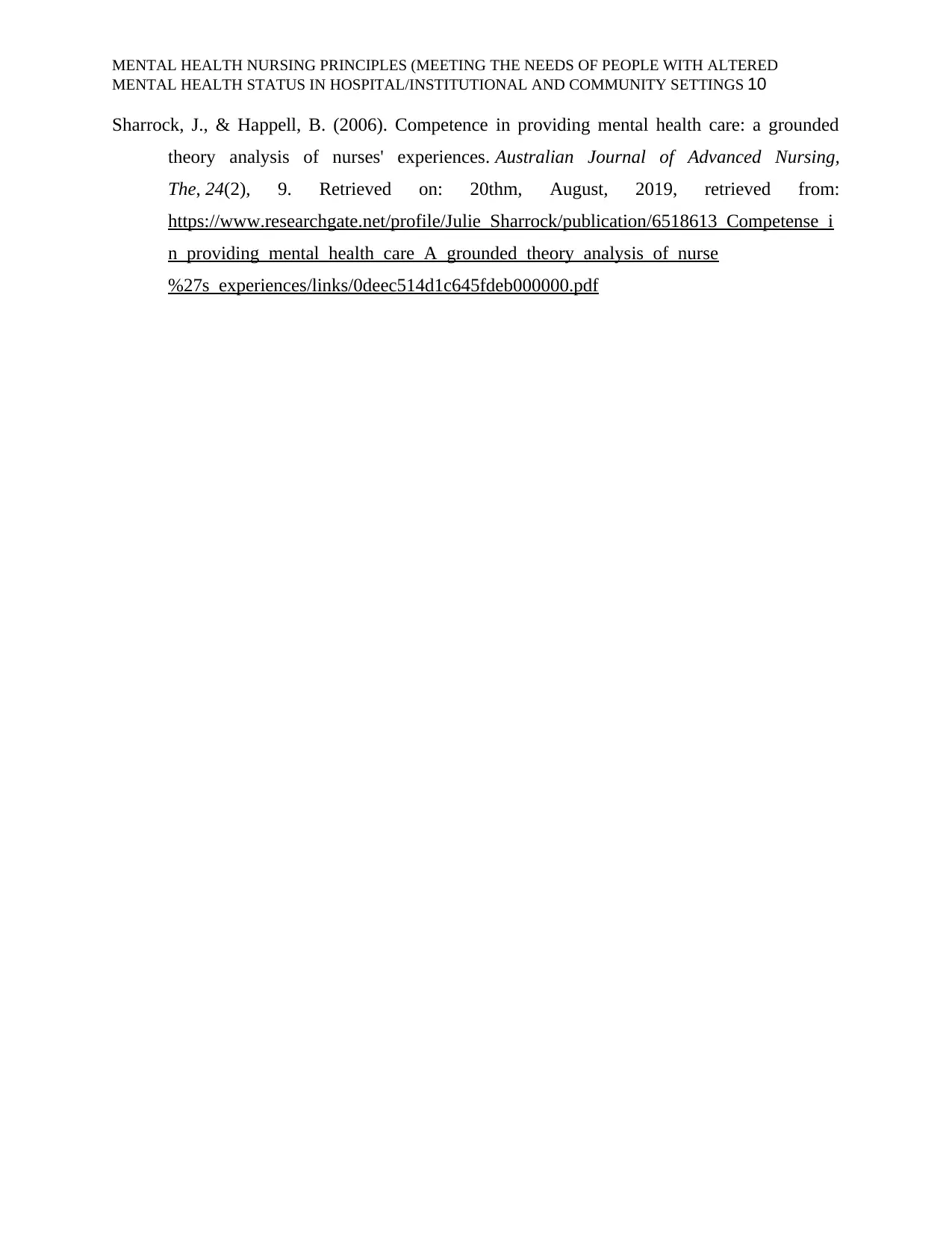
MENTAL HEALTH NURSING PRINCIPLES (MEETING THE NEEDS OF PEOPLE WITH ALTERED
MENTAL HEALTH STATUS IN HOSPITAL/INSTITUTIONAL AND COMMUNITY SETTINGS 10
Sharrock, J., & Happell, B. (2006). Competence in providing mental health care: a grounded
theory analysis of nurses' experiences. Australian Journal of Advanced Nursing,
The, 24(2), 9. Retrieved on: 20thm, August, 2019, retrieved from:
https://www.researchgate.net/profile/Julie_Sharrock/publication/6518613_Competense_i
n_providing_mental_health_care_A_grounded_theory_analysis_of_nurse
%27s_experiences/links/0deec514d1c645fdeb000000.pdf
MENTAL HEALTH STATUS IN HOSPITAL/INSTITUTIONAL AND COMMUNITY SETTINGS 10
Sharrock, J., & Happell, B. (2006). Competence in providing mental health care: a grounded
theory analysis of nurses' experiences. Australian Journal of Advanced Nursing,
The, 24(2), 9. Retrieved on: 20thm, August, 2019, retrieved from:
https://www.researchgate.net/profile/Julie_Sharrock/publication/6518613_Competense_i
n_providing_mental_health_care_A_grounded_theory_analysis_of_nurse
%27s_experiences/links/0deec514d1c645fdeb000000.pdf
1 out of 10
Related Documents
Your All-in-One AI-Powered Toolkit for Academic Success.
+13062052269
info@desklib.com
Available 24*7 on WhatsApp / Email
![[object Object]](/_next/static/media/star-bottom.7253800d.svg)
Unlock your academic potential
© 2024 | Zucol Services PVT LTD | All rights reserved.





